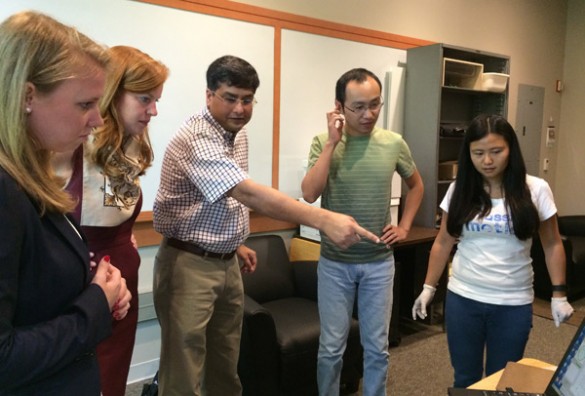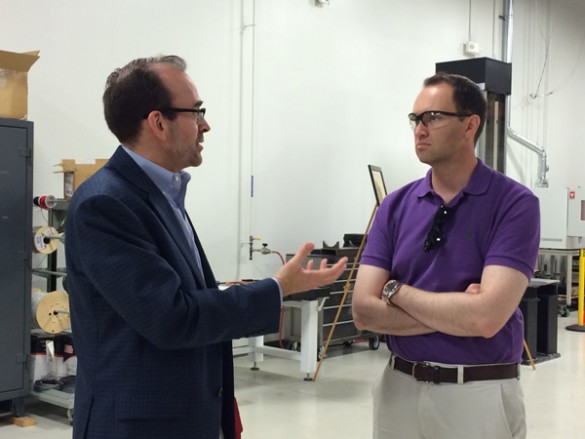
Professor of Mechanical Engineering Nilanjan Sarkar (center), accompanied by Ph.D. students Dayi Bian (second from right) and Jian Fan (far right), shows Kayla McMurry (far left) and Mackensie Burt (second from left) from Sen. Lamar Alexander’s staff the simulator that he developed with researchers at the Vanderbilt Kennedy Center to help teenagers with autism learn to drive. (Vanderbilt University)
An unusually long summer recess for Congress—totaling seven weeks—gave members of Congress the opportunity to return to their states and districts to meet with constituents. It also afforded Vanderbilt the unique opportunity to host numerous congressional staff on campus in August.
All told, the university’s Office of Federal Relations organized campus visits for seven staffers from the offices of Sen. Lamar Alexander, R-TN, and Reps. Jim Cooper, D-TN, Marsha Blackburn, R-TN, and Chuck Fleischmann, R-TN. These visits provided congressional staff with an opportunity to see federally funded research labs firsthand and to meet with Vanderbilt faculty, students and staff to gain a better understanding of the university’s federal priorities—including, in particular, the need for steady, sustained federal investments in research and education.
“Congressional staff visits give us an unparalleled opportunity to illustrate Vanderbilt’s research, supplementing the conversations we have in Washington about the importance of federal funding for science,” said Christina West, assistant vice chancellor for federal relations. “These visits also give congressional staffers who work on issues relevant to Vanderbilt an opportunity to discuss with faculty and administrators how things work at Vanderbilt and how potential federal policy proposals could impact us.”

Professor Douglas Adams (left) gives Daniel Tidwell from Rep. Chuck Fleischmann’s staff a tour of the LASIR Lab. (Vanderbilt University)
Most of the visits were research-focused, with staffers visiting the labs of several engineering faculty to see their research and hear how federal funding from agencies such as the Department of Defense, the Department of Energy (DOE), and the National Science Foundation is critical to their work. Several staff had the opportunity to visit Douglas Adams’ Laboratory for Systems Integrity and Reliability (LASIR Lab). Adams, the Daniel F. Flowers Professor and chair of the Department of Civil and Environmental Engineering, highlighted in particular his role in the DOE-funded Institute for Advanced Composites Manufacturing Innovation and his collaborations with Oak Ridge National Lab.
“We always warmly welcome legislative representatives to our campus laboratories to learn more about Vanderbilt’s research and educational mission,” said Philippe M. Fauchet, dean of the School of Engineering. “It is important for our legislators to know the impact of the work done here so Congress can continue to defend basic research funding in Washington, D.C. These research investments are a public good that benefits local communities as well as contributes to the nation’s economic development.”
Staff also had an opportunity to meet with School of Nursing Dean Linda Norman and members of her leadership team, who provided an overview of the school, its NIH-funded research, and the school’s outreach at clinics in and around Nashville. Discussion also centered on the school’s interdisciplinary programs. Other meetings provided staff an opportunity to learn about technology transfer at Vanderbilt as well as the Fisk-Vanderbilt Master’s-to-Ph.D. Bridge Program.
Vanderbilt faculty, students and administrators who met with congressional staff shared their enthusiasm for their work with the visitors, who left campus with a much better understanding of the type of research and educational activities that take place at Vanderbilt.
Media Inquiries:
Gabriella Ra’Anan,
gabriella.raanan@vanderbilt.edu